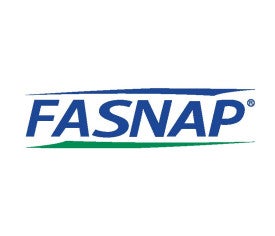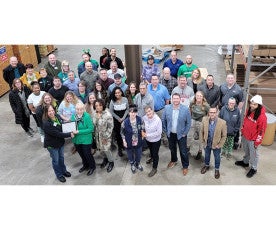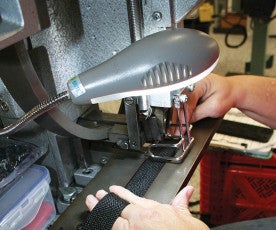HARDWARE PREVAILS THROUGH TRAVAILS
Like other industries, hardware and narrow trim companies suffered some hard knocks during the pandemic. But manufacturers and suppliers of fasteners, webbings and trim see brighter days ahead.
COVID-19 battered economies and companies worldwide, with few industries spared its effects. But if the pandemic turned lives upside down, it also unleashed creativity, determination and a refusal to say "uncle." The result in a lot of cases wasn't just mere survival, but something closer to thriving despite it all. Examples of this can be found among manufacturers and suppliers of fasteners, webbings, elastics, trims, bindings and other goods that textile products providers rely on.
Although certainly battered at times, many somehow managed to find their way through the early days of closures, lockdowns and uncertainty. They held their companies together and kept their staffs intact, pivoting to new markets when necessary, strategizing supply chain work-arounds, securing hard-to-find materials and helping their customers keep their own businesses open and viable. We highlight the stories of three companies here: how they made it through those first months, where they are now and what they see ahead. Despite what they've weathered, their optimism remains intact.
Fasnap Corp.

A Fasnap® Corp. machine is readied to add snaps to webbing. When COVID hit, the company was one of the first IFAI members to declare as a Critical Infrastructure Supply Chain Partner, remaining open and serving its 60-plus markets with globally-sourced fastening solutions. Photo: Fasnap Corp.
Keeping a watchful eye
As luck would have it, COVID struck just as the completion of Fasnap® Corp.'s facilities expansion-one enlarging its office and production facilities by an additional 14,000 square feet-was being finalized, says Doug Reed, president of the fastening solutions manufacturer. Headquartered in Elkhart, Ind., the company provides snap fasteners, grommets, eyelets and narrow woven textiles used in boat top covers, semi-truck interiors/passenger vehicles, military-grade personal equipment, space suits and more.
"Construction began in late 2018 and was completed in early February 2020," Reed recalls. "Office equipment was installed immediately and our staff set up workspaces. Then, March came along with lockdowns, social distancing and everything else."
However, Fasnap became one of the "very first" IFAI members to be declared as a critical infrastructure supply chain partner, says Reed, allowing the company to remain open, with some staff working remotely, and some in production areas that had already been designed as 8-by-8-foot work cells, fortuitously adhering to the CDC's 6-foot distancing guidelines.
"Many of our products are used in manufacturing face shields, face masks, partitions or curtains, even body bags," Reed explains. "While our own internal capabilities are limited for producing those items, we were able to facilitate matching inquiries and needs with local companies capable of manufacturing them."
The company's first-quarter revenues did take a big hit, due to local-market shutdowns and subsequent layoffs. Still, says Reed, the company not only hung onto its 44 employees but added two more by the end of that fiscal year. (Fasnap currently has 48 full-time employees, with openings throughout the organization.)
Supply chain issues were somewhat mitigated by a new materials requirement planning and advanced capacity planning process Fasnap implemented in 2019, which gave staff members the tools to collaborate more closely with the company's key stakeholders. Even so, strategizing was necessary at times. As families sought to spend more time outdoors, demand from the local RV, leisure boat and marine textiles markets shot up, at times doubling compared to periods past.

Grommets are shown being inserted into webbing. Fasnap® Corp. provides a range of products including snap fasteners, grommets, eyelets and narrow-woven textiles destined for boat top covers, semi-truck interiors, passenger vehicles, signs, banners, tactical/military-grade personal equipment and more. Photo: Fasnap Corp.
Cooperation is key
"The key to managing such cyclical demand was and continues to be close cooperation between our customers, factories and factory suppliers, again matching future requirements across the entire supply chain," Reed explains. "Long supplier lead times are normal for Fasnap, yet as we saw demands and costs increasing, we began placing supplier orders out further, rather than creating a logjam for our partners and customers."
Reed is keeping a watchful eye on the war in Ukraine, believing it presents a threat similar to the 2008 financial crash with respect to its potential long-term impact. As such, the company is identifying "performances ranges for upside and downside conditions," modeling a 24-to-30-month impact on its markets.
Product demand is shifting from what it was during COVID, which saw increased consumer demand for handguns, rifles, cases and ammunition, leading to shortages in certain industrial metals (such as copper) among its manufacturing partners adhering to the Buy American Act or the Berry Amendment.
But the Russian invasion has accelerated international demand for the company's military-grade product lines, with much of it heading overseas to support the Ukrainian fighters and medical personnel, says Reed.
Labor shortages remain a concern, particularly given Elkhart's very low unemployment rate and the competition for workers amid a shrinking labor pool. Still, Reed believes the road ahead looks good.
"In the short term we'll continue to see ups and downs, consumer trends will change, and we'll continue to see global supply chains alter to meet growing threats and opportunities," he says. "It comes down to what business leaders and owners want when balancing risk aversion versus possible reward. Are they focused on the next few months or years, or are they implementing strategies and plans for five or 10 years into the future?"
Pamela Mills-Senn is a Seal Beach, Calif.-based freelance writer.






Validate your login
Sign In
Create New Account